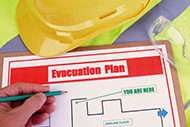Joint Commission reissues Survey Activity Guides with life safety corrections
The Joint Commission has published its 2017 Survey and Review Process Activity Guides. The guides detail changes that affect hospital, critical access hospital and other accreditation programs.
The Accreditation Survey Activity Guide for Health Care Organizations includes several corrections and clarifications related to the Hospital/Critical Access Hospital Document List, the Life Safety and Environment of Care Document List and Review Tool, and the Nursing Care Centers Document List. However, only minimal changes were made to the 2017 Ambulatory Care Accreditation Survey Activity Guide for Health Care Organizations.
DHS issues National Cyber Incident Response Plan
The Department of Homeland Security released a National Cyber Incident Response Plan (NCIRP) to articulate the roles and responsibilities, capabilities and coordinating structures that support how the nation responds to and recovers from significant cyber incidents posing risks to critical infrastructure. The plan was developed in coordination with other federal agencies and public and private partners, including representatives from the health care and public health sector. “The NCIRP is not a tactical or operational plan; rather, it serves as the primary strategic framework for stakeholders to understand how federal departments and agencies and other national-level partners provide resources to support response operations,” the document notes.
ASPR posts resources on new CMS emergency rule compliance
The Centers for Medicare & Medicaid Services' new emergency preparedness requirements went into effect Nov. 15, 2016, with participating facilities being given one year to comply with the regulations. The rule applies to 17 provider types, and specific requirements are adjusted based on classification. The Department of Health & Human Services Office of the Assistant Secretary for Preparedness and Response has developed a new resource to help health care facilities comply with the new rule, including a chart that highlights requirements by provider type.
AHRQ develops ventilator safety toolkit
The Agency for Healthcare Research and Quality’s Toolkit to Improve Safety for Mechanically Ventilated Patients consists of four modules and other resources to help hospitals make care safer for intensive care patients. The AHRQ resource was developed to help guide intensive care unit staff on how to uncover local defects, implement interventions to prevent ventilator-associated events and build a sustainable safety culture.
Chinese researchers compare cleaning methods to help prevent MRSA
Researchers in China looked into two cleaning methods for patient rooms and their effectiveness in preventing transmission of methicillin-resistant Staphylococcus aureus (MRSA) in the health care setting.
The study compares whole room cleaning — in which staff clean the room just before patient care activities begin or during other parts of the day — with frequent wipe cleaning of touched surfaces.
They found that continuous wipe cleaning of both high- and low-touch surfaces provides substantial reduction in the exposure of the susceptible patient to MRSA. A total wiping frequency of three per hour results in, at most, a 57 percent reduction in the MRSA exposure.




